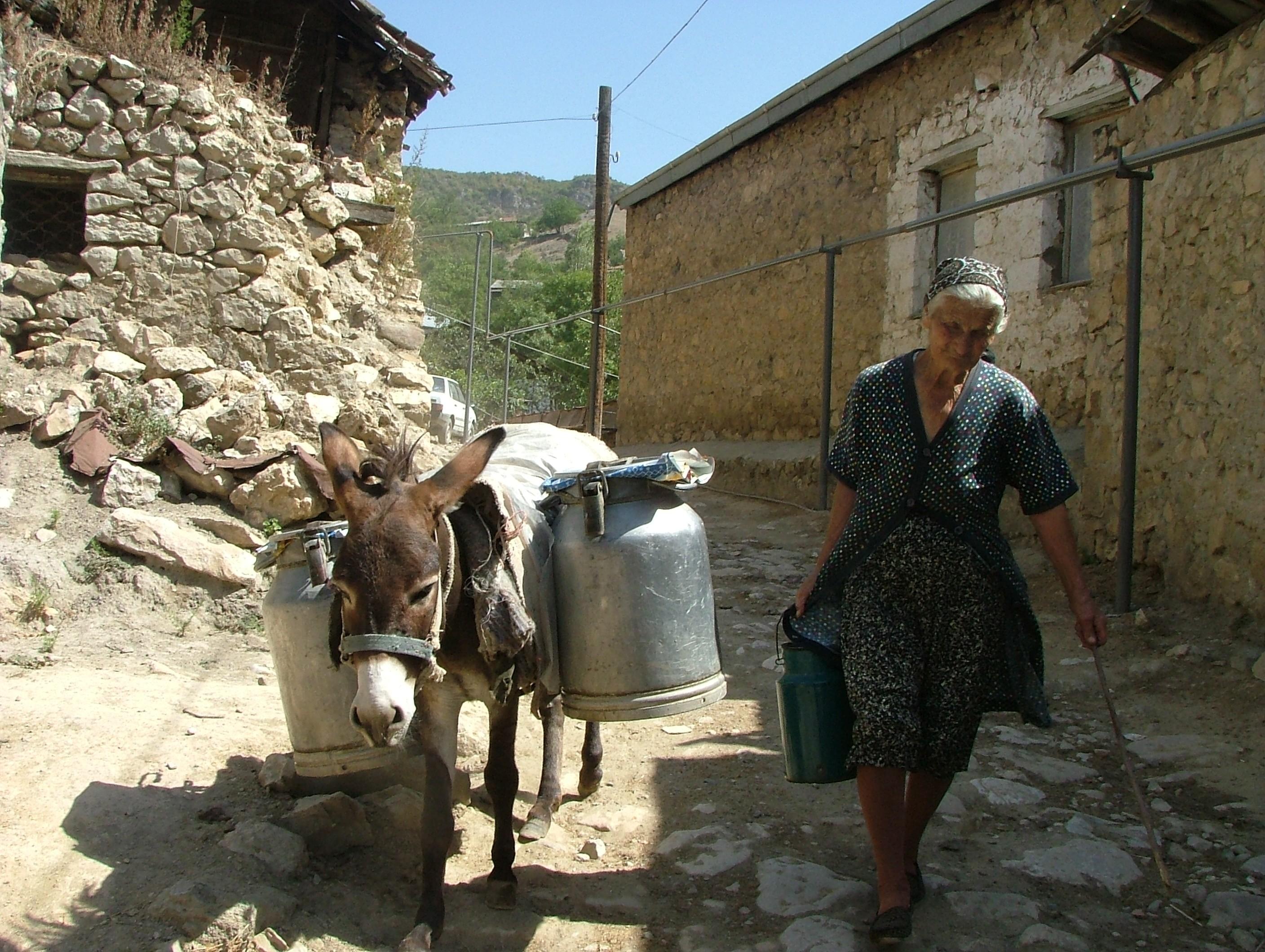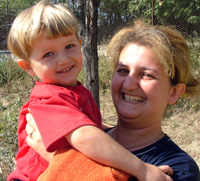
Mets Tagher – Khudyakov’s Native Land
The hooves of horses and donkeys could be heard on the narrow cobblestone streets. Children with buckets went to the spring to collect water. A donkey loaded with buckets brayed under its weight, but the owner urged it forward with a switch – his wife needed to do the laundry.
In the middle of the village, in a small central square, there were two boards placed on pairs of rocks, used as makeshift benches – one for the youth, the other for the elderly. The youth bench was empty. The other was occupied by a few old men fingering their worry beads with concern.
The mountains surrounding the village looked unreal in the rays of the afternoon sun. The rocks called Dizapayt, located between Toghasar and Goroz Berd [mountain ranges] looked like a woman caught in labor pains. Toghasar resembled a lion, while the mountain which had the remains of the Goroz fort on its summit looked like an eagle that had spread its wings. The eagle and lion seemed to be calming the woman in labor.
This was Mets Tagher – the largest village in the Hadrut region of Karabakh. The old woman who had agreed a little while earlier to be my guide handed me over to Nairi, the daughter of a man who had written about Mets Tagher who I was scheduled to meet in the evening. It was fun to hop from rock to rock while the old woman accompanied me through the village, but I could not understand a word she said in her dialect.
 Nairi was sweeping the floor when we entered her house. She said without worry that lunch – and the three children she had to pick up from kindergarten – could wait, and we set off to explore the village.
Nairi was sweeping the floor when we entered her house. She said without worry that lunch – and the three children she had to pick up from kindergarten – could wait, and we set off to explore the village.
Most of the men were in the fields, while the women were busy indoors with domestic chores and it was too early for the young people to come outdoors.
Nairi took me from house to house, and we were fed the local delicacies of grapes and figs everywhere we went. The figs were divine – my tongue hurt from eating so many of them.
Mets Tagher was half asleep. Serenity flowed from the houses, trees, and faces.
“Nothing interesting,” was what villagers replied when I asked “What's going on?”
Nevertheless, there was at least one interesting thing for sure in their monotonous and uneventful lives. The whole village was waiting with bated breath for Karine, a 48-year old local woman, to give birth. She already had three children; her eldest was twenty-five years old.
I met Karine in the morning. She was a short, delicate woman, melancholic but bright-eyed, with a subtle smile. She said that she was due to give birth in a few days and avoided going out into the village.
“But why? The birth of a child is a miracle, especially at this age.”
“They look at me strangely in the village,” she said, shaking her head.
“You've done nothing wrong. You are going to have your husband's child, that's normal.”
“That's exactly it,” she said softly.
It suddenly dawned on me that she was not ashamed of having the child, but of everyone knowing that she had had sexual relations with her husband at that age.
Karine is a mathematician by training but a singer by vocation. She set up a choir a few months ago which had successful performance in Hadrut and Stepanakert. They had not been able to find musicians and the children would sing a cappella. When Karine became pregnant, she left the choir and started teaching history at school. Due to her faith, she did not even consider an abortion.
It turned out that there was a church in the village, but neither of my guides had thought of taking me there or even mentioning its existence. The villagers were indifferent to religion. That was why the religious schoolteacher was looked upon almost as an alien here. Karine, however, was wrong on one count – with very few exceptions, the villagers looked upon her with love and respect.
Nairi proudly took me to the school. Classes were over already; the school was closed and I could not understand why she had brought me there. It turned out that she wanted to show me a bust of Marshal Khudyakov that stood in front of the school building.
Hmm, I didn't know that Khudyakov was born here. In fact, the villagers themselves only found out in 1957, when the widow of the aviation marshal brought their son to Mets Tagher, to show him their native land. It was then that the villagers discovered that the Soviet hero Khudyakov was none other than Armen Khanperyants, a local man. The bust of Khudyakov is now the pride of Mets Tagher.
We went to the Kazh Teahouse to have something to drink. Garik, the manager, is Nairi's husband. The teahouse, which had only four tables and a few seats, was half empty.
“It's not a very profitable business,” said Garik, “Obviously, people don't come here from other villages, and you can't expect our local villagers to come here every day – they have work to do, and don't have much money to spare.”
The teahouse, in fact, was quite impressive – it had rough stone walls covered with black and white photographs, and urns, spindles and other antiques decorating the floor. The Russian pop song, around five years old, that the television churned out seemed out of place in the cave decor of the teahouse.
There was a carpet weaving workshop above the teahouse. Before the war, it used to be the most famous one in Karabakh. The elderly of the village said that the workshop was first established during the days of the Czar and the carpets woven there were sold abroad. The workshop was closed after the war. A few months ago, Arthur Aghabekyan, the deputy minister for defense of Karabakh, who was born in this village, reestablished production. Garik was the manager of the workshop as well, and, once again, had something to say.
“Weaving carpets means sitting in the workshop every day from nine in the morning till six at night. But women cannot do that, they have to spend time with their families and in the fields. One of our workers has left for Moscow; another got married and moved to a neighboring village. We have fewer orders now. If only salaries were higher, the women would stay and work.”
Like everyone else, Garik complained without anger, without any demands, without even discontent. In my opinion, his complaints can simply be attributed to the Armenian temperament.
“But I am grateful to Arthur,” he said soberly. “He has done a lot.”
Aghabekyan's name invokes greater reverence here than even that of Khudyakov. He has a hand in every new enterprise in the village including the modern beauty salon with its European toilet (this aspect of it is especially emphasized, because it is the only normal toilet in the village, and perhaps in the whole region) as well as a water park located not far from the village (none of my new acquaintances from Mets Tagher has been there as yet).
 Videos
Videos Photos
Photos
Write a comment